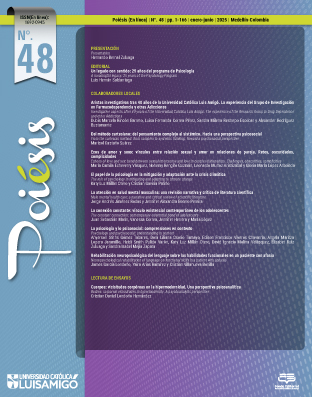The role of psychology in mitigating and adapting to climate change
DOI:
https://doi.org/10.21501/16920945.5013Keywords:
adaptation, climate change, mental health, mitigation, psychologyAbstract
This reflection examines the fundamental contribution of psychology in addressing the global climate crisis. It analyzes how the impacts of climate change, such as extreme events and environmental disruptions, can affect mental health, generating stress, anxiety, and trauma. This highlights the need for an interdisciplinary response involving psychology. Additionally, it explores the psychological factors that influence individual and collective responses to this crisis, such as cognitive, emotional, and behavioral barriers that hinder the adoption of sustainable behaviors. Psychology faces key challenges, such as promoting effective behavior change, improving climate communication, addressing inequalities, and fostering environmental justice. Finally, it emphasizes the importance of a collaborative approach where psychology integrates with other disciplines to provide comprehensive solutions that promote mitigation, adaptation, and resilience in the face of the impacts of global warming.
Downloads
References
Ágoston, C., Urban, R., Nagy, B., Csaba, B., Kőváry, Z., Kovacs, K., & Demetrovics, Z. (2022). The psychological consequences of the ecological crisis: Three new questionnaires to assess eco-anxiety, eco-guilt, and ecological grief. Climate Risk Management, 37, 100441. https://doi.org/10.1016/j.crm.2022.100441
Barrera-Hernández, L. F., Corral-Verdugo, V., & Fraijo-Sing, B. S. (2021). El futuro trascendental como determinante de las conductas sustentables y la percepción de felicidad. CES Psicología, 14(1), 2-15. https://doi.org/10.21615/cesp.14.1.2
Bourque, F., & Cunsolo Willox, A. (2014). Climate change: the next challenge for public mental health? International review of psychiatry, 26(4), 415-422. https://doi.org/10.3109/09540261.2014.925851
Clayton, S., Devine-Wright, P., Stern, P. C., Whitmarsh, L., Carrico, A., Steg, L., ... & Bonnes, M. (2015). Psychological research and global climate change. Nature climate change, 5(7), 640-646. https://www.nature.com/articles/nclimate2622
Clayton, S., Manning, C., Krygsman, K., & Speiser, M. (2017). Mental health and our changing climate: Impacts, implications, and guidance. Washington, DC: American Psychological Association and ecoAmerica.
Clayton, S. (2019). Psychology and climate change. Current Biology, 29(19), R992-R995. https://doi.org/10.1016/j.cub.2019.07.017
Colegio Colombiano de Psicólogos. (2022). Acuerdo No. 067 SNC. Por el cual se crea el Nuevo Campo de la Psicología Ambiental y Sostenibilidad. https://www.colpsic.org.co/comunicados/resolucion-no-067-snc-por-la-cual-se-crea-el-nuevo-campo-de-la-psicologia-ambiental-y-sostenibilidad/
Cunsolo, A., Ellis, N.R. Ecological grief as a mental health response to climate change-related loss. Nature Clim Change 8, 275–281 (2018). https://doi.org/10.1038/s41558-018-0092-2
Csutora, M. (2012). One more awareness gap? The behaviour–impact gap problem. Journal of consumer policy, 35(1), 145-163. https://doi.org/10.1007/s10603-012-9187-8
Doherty, T. J., & Clayton, S. (2011). The psychological impacts of global climate change. American Psychologist, 66(4), 265-276. https://pubmed.ncbi.nlm.nih.gov/21553952/
Fritze, J. G., Blashki, G. A., Burke, S., & Wiseman, J. (2008). Hope, despair and transformation: Climate change and the promotion of mental health and wellbeing. International journal of mental health systems, 2, 1-10. https://link.springer.com/article/10.1186/1752-4458-2-13
Gifford, R. (2011). The dragons of inaction: psychological barriers that limit climate change mitigation and adaptation. American psychologist, 66(4), 290. https://doi.org/10.1037/a0023566
Gifford, R., & Nilsson, A. (2014). Personal and social factors that influence pro‐environmental concern and behaviour: A review. International journal of psychology, 49(3), 141-157. https://doi.org/10.1002/ijop.12034
Harvard University Center on the Developing Child. (2022). InBrief: The Impact of Early Adversity on Children’s Development. https://developingchild.harvard.edu/resources/inbrief-the-impact-of-early-adversity-on-childrens-development/
Heath, Y., & Gifford, R. (2006). Free-market ideology and environmental degradation: The case of belief in global climate change. Environment and behavior, 38(1), 48-71. https://doi.org/10.1177/001391650527799
Karlsson, H., Erlandsson, A., Asutay, E., & Västfjäll, D. (2024). The role of environmental mental imagery in impact beliefs about climate change mitigation and pro-environmental intentions. Current Research in Ecological and Social Psychology, 6, 100181. https://doi.org/10.1016/j.cresp.2024.100181
Leiserowitz, A. (2006). Climate Change Risk Perception and Policy Preferences: The Role of Affect, Imagery, and Values. Climatic Change 77, 45–72. https://doi.org/10.1007/s10584-006-9059-9
López-Cabanas, M., & Aragonés, J. I. (2019). Psicología y medioambiente: un reto ineludible. Papeles del psicólogo, 40(3), 161-166. https://doi.org/10.23923/pap.psicol2019.2908
Millán Otero K, L & Sierra Barón W. (2022). Tendencias de investigación en Psicología Ambiental. Una revisión sistemática cualitativa. En: Millan Otero K, Sierra Baron, W, Navarro, O. (Eds). Psicología ambiental, volumen II. Experiencias, diálogos y perspectivas de investigación. (pp 64-85). Ascofapsi. https://editorial.ascofapsi.org.co/books/psicologia-ambiental-volumen-ii-experiencias-dialogos-y-perspectivas-de-investigacion/
Pearson, H. (2024). The rise of eco-anxiety: scientists wake up to the mental-health toll of climate change. Nature, 628(8007), 256-258. https://canisgallicus.com/2024/04/11/the-rise-of-eco-anxiety-scientists-wake-up-to-the-mental-health-toll-of-climate-change-publication-nature/
Spence, A., Poortinga, W., & Pidgeon, N. (2012). The psychological distance of climate change. Risk Analysis: An International Journal, 32(6), 957-972. https://doi.org/10.1111/j.1539-6924.2011.01695.x
Wannewitz, M., & Garschagen, M. (2023). Collective adaptation to climate change. Current Opinion in Environmental Sustainability, 61, 101248. https://doi.org/10.1016/j.cosust.2022.101248
Wynes, S., Zhao, J. & Donner, S.D. How well do people understand the climate impact of individual actions?. Climatic Change 162, 1521–1534. https://doi.org/10.1007/s10584-020-02811-5
Downloads
Published
How to Cite
Issue
Section
License

This work is licensed under a Creative Commons Attribution-NonCommercial-NoDerivatives 4.0 International License.
La revista y los textos individuales que en esta se divulgan están protegidos por las leyes de copyright y por los términos y condiciones de la Licencia Creative Commons Atribución-No Comercial- 4.0 Internacional. Permisos que vayan más allá de lo cubierto por esta licencia pueden encontrarse en http://www.funlam.edu.co/modules/fondoeditorial/ Derechos de autor.











